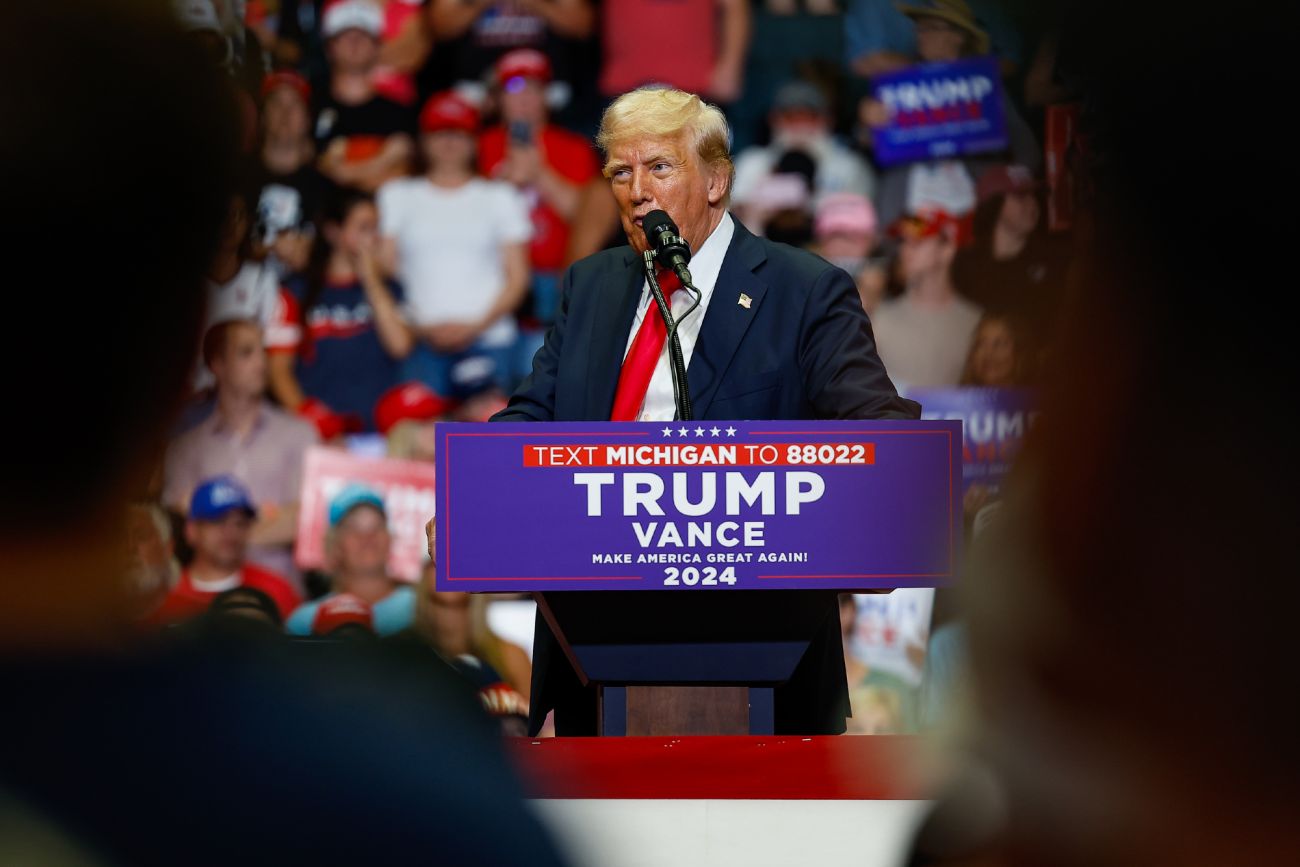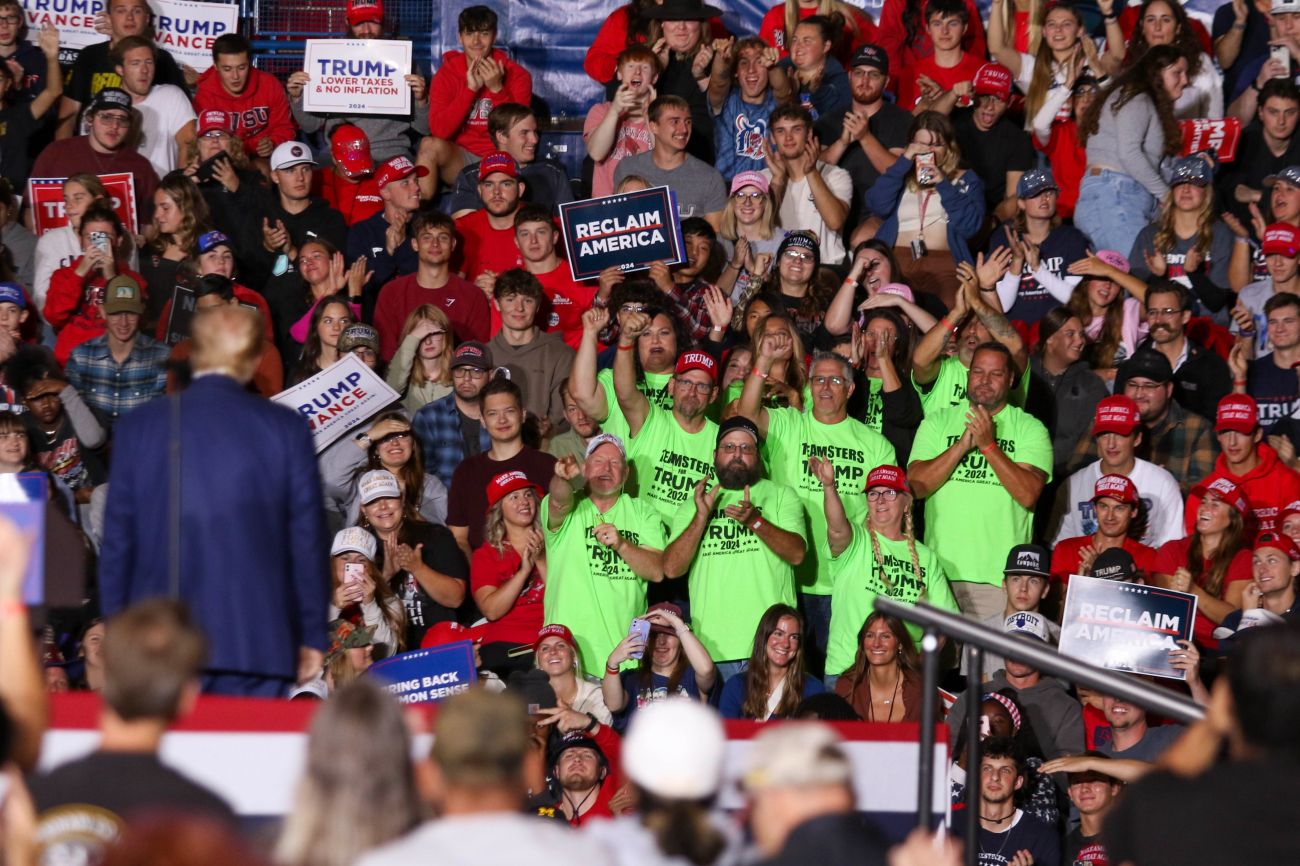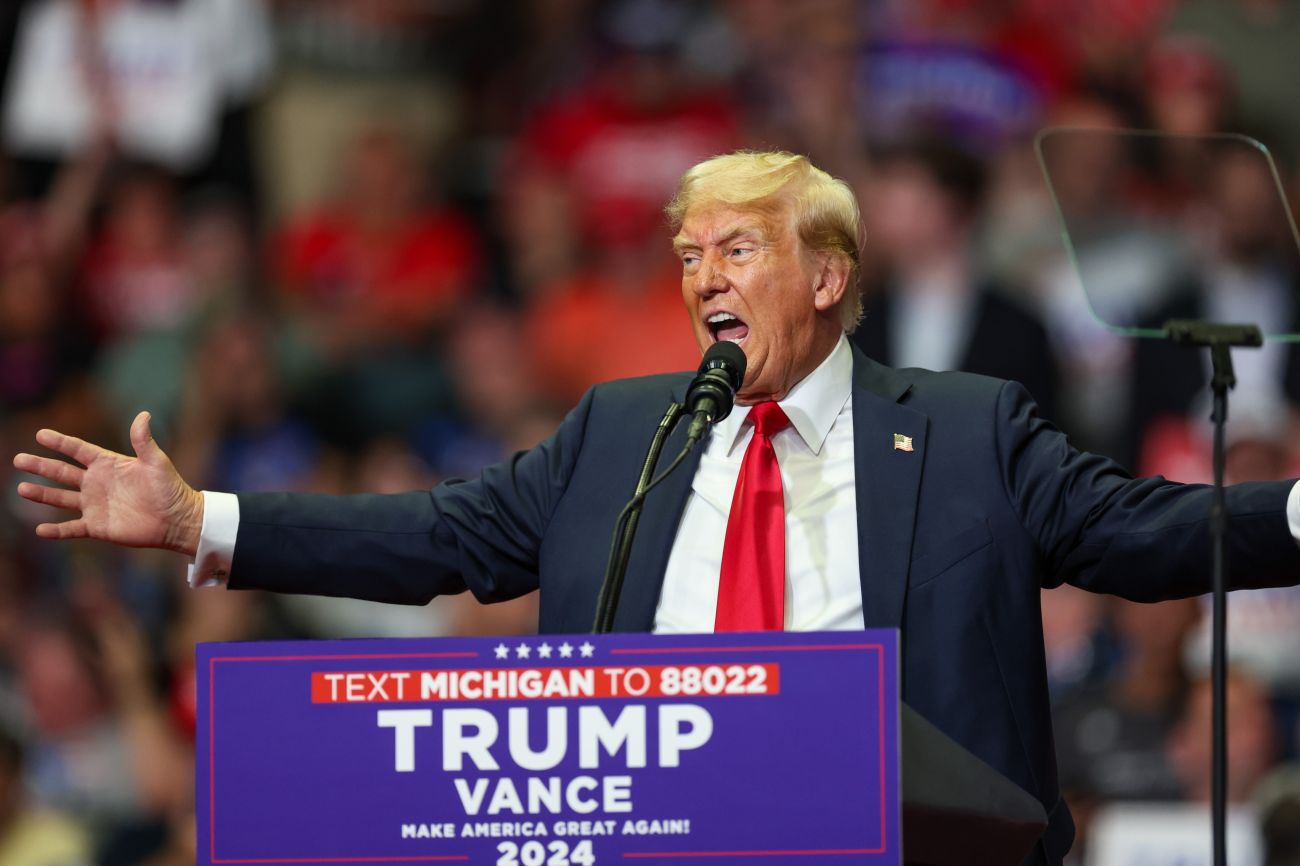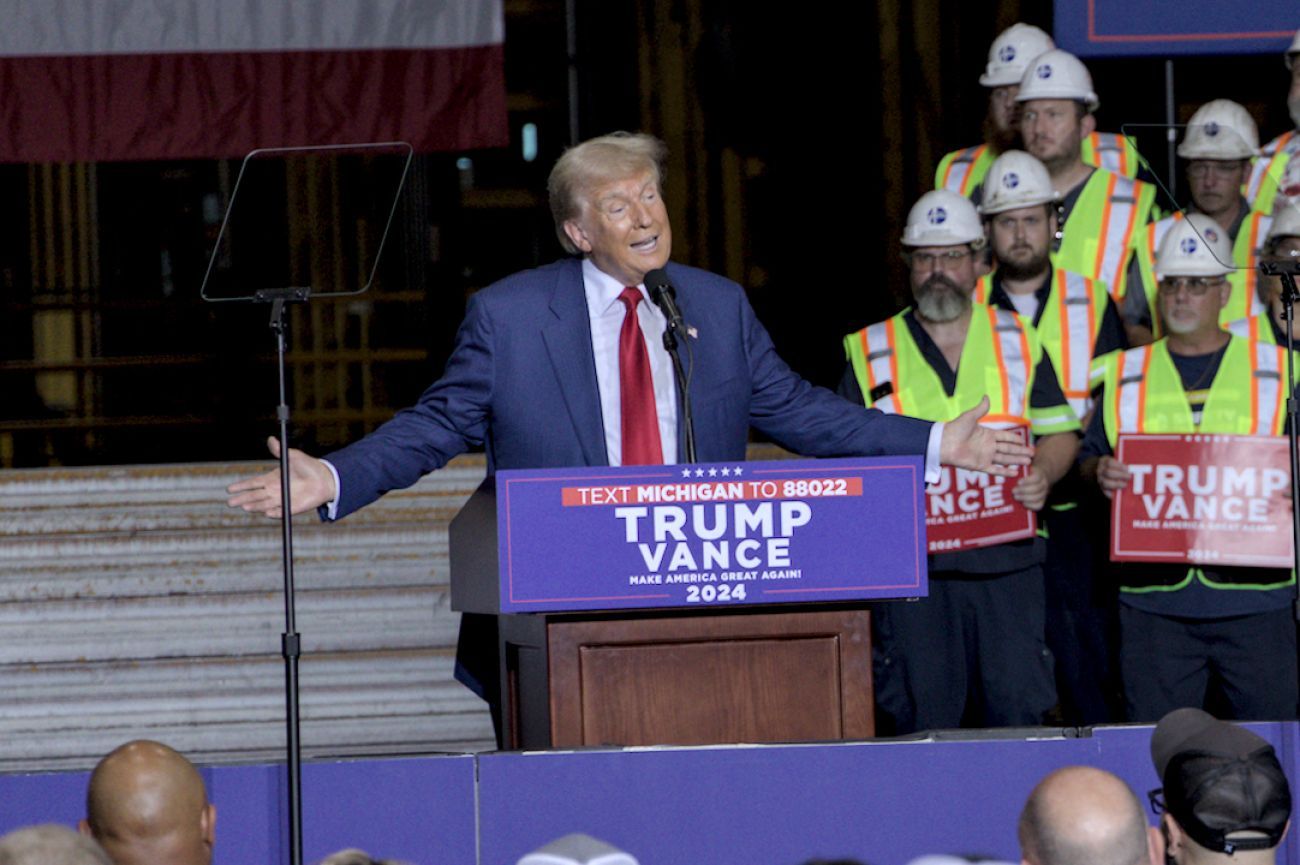Fact check: Trump promised a ‘Michigan miracle.’ Now comes the hard part

- As he sought Michigan votes, President-elect Donald Trump made big promises to restore decades of lost auto jobs, cut costs and more
- Bridge Michigan reviewed more than 11 hours of Trump campaign speeches to document his many vows as he prepares to take office
- Experts say it will be ‘exceedingly difficult’ for Trump to follow through on all his promises
President-elect Donald Trump made scores of promises to Michigan as he wooed voters here, vowing to make the auto industry “greater than it’s ever been” while cutting taxes, household costs, crime and more.
“Standing before you today, I am proclaiming that by the end of my term, the entire world will be talking about the Michigan miracle and the stunning rebirth of Detroit,” Trump told a crowd gathered in Novi in late October.
Beyond vows for the auto industry, Trump promised to cut the price of gas — and all energy costs — in half within his first year. Tariffs will rise, jobs will increase; inflation will wane and prices will fall, he told voters in stops across the state.
In all, Trump made at least 100 unique promises to Michigan voters during 21 campaign stops in the state during his campaign for president last year. Bridge Michigan reviewed nearly 11 hours of his campaign speeches to catalogue them.
More than one-third the promises relate to the auto industry, including pledges to “bring it back” to “where it was 50, 60 years ago” and create “more jobs than you had in its heyday.”
Others focused on the standard of living, with promises that groceries “will be cheaper, your paychecks will be higher, your streets will be safer and cleaner” during a “golden age of America.”
All politicians make promises during campaigns, but many of Trump’s were more specific and quantifiable, such as his Warren vow on Nov. 1 pledge to build a "missile defense shield … all over our country. Made in the USA, much of it made in Michigan."
“It is going to be exceedingly difficult to meet all these promises,” said Dave Dulio, a political science professor at Oakland University.
“To some extent it doesn’t matter for Trump,” who will be constitutionally barred from seeking a third term. Dulio said. “He’s not running again.”
But it matters to Michigan. So Bridge is chronicling promises to provide reality checks of what it will take to fulfill them.

Promises: Jobs, tariffs
Trump said high tariffs are central to encouraging companies to bring back factories and jobs to Michigan.
“You will see a mass exodus of manufacturing jobs from Mexico to Michigan, from Shanghai to Sterling Heights, and from Beijing to Detroit,” Trump told the Detroit Economic Club in October.
Along with lower taxes, fewer regulations and increased energy production, the tariffs will “drive prices down, lower interest rates and put more money into the pockets of American consumers,” Trump predicted.
Americans are split on raising tariffs: A December Monmouth University poll found opinion is evenly divided, a significant portion believe it would hurt their families economically (47% to 23% who disagreed.)
Reality check: Even though the US is the world’s biggest economy, it is still part of the global economy. Other countries have threatened to react to Trump’s vows to impose a 25% tax on all products entering the country from Canada and Mexico, as well as a 10% tariff on goods from China.
In Michigan, more than 409,000 people earned a living building cars in 1978. Now, 175,000 do.
“I don’t think he’s going to get all those jobs back,” said Chris Douglas, a professor of economics at the University of Michigan-Flint.
He called Trump’s promises “hyperbole,” noting that the United States lost manufacturing jobs over the past 30 years to new and existing trading partners.
More losses were due to technological advances and higher fuel prices, which pushed consumers to more fuel-efficient cars, he said.
“No amount of tariffs are going to change those two things,” Douglas said.
Garrett Watson, a senior policy analyst for the Tax Foundation, a non-partisan tax policy think tank, cautioned that it could take five years to over a decade to see if the tariffs have their intended effect and bring jobs back.
But he said the threat of tariffs could spark high-level trade negotiations with other countries like China, Canada and Mexico, all of which have huge trade relations with the US.
Promise: Cut energy costs in half in 12 months
Trump said he will relax regulations on energy production, allowing companies to “frack, frack, frack and drill baby drill.”
In an October speech in Detroit, he said he’d cut energy costs in half in just one year (in other states, he said it could take “18 months max”).
Michigan, which ranks 10th in total residential energy use, according to federal records. Every year, energy costs Michigan residents about $4,600 apiece.
Lower gas prices could boost the Big Three, profit-wise, because they make their most money selling trucks and SUVs, Douglas said.
Reality check: Energy sources are global commodities. What gets generated in the US is part of a huge market that connects producers in the US to those in Venezuela, Saudi Arabia, Canada and elsewhere. Often, to keep prices higher, oil cartels like OPEC have restricted production.
Related:
- 100 promises Donald Trump made to Michigan
- Ten ways Michigan may change under Trump, from doctors and EVs to school lunch
- Donald Trump’s path to victory in Michigan: Expand support nearly everywhere
“Although President-elect Trump’s stated goal is to drive down energy costs for American consumers, it is possible that his policies could have the opposite effect,” surmised experts with Wood Mackenzie, an energy consulting firm that was also supportive of some of Trump’s energy proposals and appointees.
Promise: End EV subsidy, ‘mandate’
Trump promised to eliminate the $7,500 subsidy for electric vehicle purchases and he called an “EV mandate” by ending a Biden administration goal to have half of all new passenger cars and light trucks sold in 2030 be “zero-emission.”
Trump blasted Biden’s pollution standards and argued the ongoing shift to EVs would devastate American autoworkers.
Polls indicate his message may have been persuasive with Michigan voters, but Detroit automakers have asked Trump to keep the rules in place.
Reality check: As president, Trump could not unilaterally remove the subsidy, set by the 2022 Inflation Reduction Act. It would require congressional approval and auto industry lobbyists are already hoping to keep them.
But his administration, through the US Environmental Protection Agency, could rescind emission standards, which the Biden administration used to encourage a move to more electric vehicles by 2030.
Promise: Deduct car loan interest
In his Oct. 10 Detroit speech, Trump declared that his administration would allow car buyers to deduct the interest from their auto loans on their taxes. In other speeches, he said this would only apply to domestically-built vehicles.
Reality check: It sounds good, but might not have much of an impact. Trump’s 2017 tax cuts raised the standard deduction to $14,600 for single filers and $29,000 for married couples. Now, about 90% of taxpayers now use the standard deduction instead of itemizing.
Promise: Tax credits for research, development
Also in Detroit, Trump said US-based car manufacturers would be able to get tax credits for expanded research and development and will be able to “write off 100%” of the cost of heavy machinery and equipment to build a new factory.
Small businesses would also get an expanded tax deduction, Trump said, doubling the amount of equipment investment they can deduct.
Reality check: Like other tax-related promises, this would require legislation. However, because many of the cuts enacted in 2017 when Trump was first president are set to expire in 2025, Congress will be debating tax issues.
Promise: End inflation
While in Michigan, Trump also made myriad promises that weren’t specific to the state, including pledges to stop inflation and lower consumer costs.
Inflation spiked under Biden, hitting 9% in 2022, but has since fallen, to 2.7% as of November. Trump did not specify how he would end inflation or lower prices but repeatedly said that lowering energy costs would drive all prices down.
Reality check: Since winning office, Trump has acknowledged that cutting consumer costs could be difficult: “It's hard to bring things down once they're up,” he told Time Magazine.
Promise: Tax cuts
On multiple occasions Trump turned to big changes in the tax code that he said he would push through. He promised that there would be:
- No taxes on worker tips, which he said “immediately is coming off”
- No taxes on overtime
- No taxes on Social Security benefits
Trump made these promises in Michigan and in stops across the nation. They have huge appeal to a broad swath of the population, from young restaurant workers to middle-aged bricklayers to retirees struggling to make ends meet.
Reality check: The former and future president can’t make those cuts by himself. He will need congressional approval, said Watson of the Tax Foundation.
The above cuts, alone, would cut an estimated $171 billion in annual revenue out of the nation’s income taxes, Watson said, and roughly $2 trillion over 10 years.
That’s on top of the trillions of dollars from Trump’s 2017 tax cuts, which Congress will have to decide in 2025 whether to extend.
Budget hawks may be wary of adding trillions more to the nation’s burgeoning national debt, Watson said. Still, it would be surprising if Congress didn’t approve any of the proposals, Watson added.

Promise: Stop illegal immigration
Pledges to stop illegal immigration and conduct mass deportations were a centerpiece of the Trump campaign. He and Vice President-elect JD Vance have predicted their plan would push up wages for US workers and free up housing, an assumption some experts have questioned.
“On day one, I will seal the border. I will stop the invasion,” Trump said during an August stop in Howell with law enforcement officers.
And in Grand Rapids in the waning hours of the campaign, he said: “On day one, I will launch the largest deportation program of criminals in American history. I will rescue every city and town that has been invaded and conquered.”
Reality check: Through federal agencies, Trump will have the ability to quickly reshape border policy and his choice as border “czar,” Tom Homan, has laid out plans to first find and deport undocumented migrants who pose threats to national or public security.
Trump does not need congressional support to enact his plans.
Nationwide, there are about 11 million people living in the United States illegally, including 91,000 in Michigan. Some studies claim providing government services to them costs $66 billion to more than $100 billion per year.
But deporting them all would also cost billions, with one report estimating the cost at more than $315 billion.
Polls about deportation offer mixed views: A recent Reuters poll, for instance, found that a majority of Americans (53%) believe that immigrants in the nation illegally should be deported, but an identical majority disagreed they should be “arrested and put in detention camps.”
Promise: Stop violent crime
In Michigan stops, Trump promised to “crush violent crime,” dismantle drug cartels and stop the flow of fentanyl into the country.
In Howell, Trump also promised:
- “Record investment” for the hiring, retention and training of police officers
- The death penalty for any illegal migrant who kills a police officer or a US citizen
- The banning of “all sanctuary cities,” which are jurisdictions where local officials have decided not to fully comply with U.S. immigration policies and enforcement.
Reality check: After climbing during the pandemic, violent crime dropped in 2023, although in several Michigan cities, rates remained far higher than 2020.
Trump would need congressional approval for any funding increases or policy changes. But his administration could strip “sanctuary cities” of federal funding if they do not participate in plans for mass deportations.
The nonprofit Center for Immigration Studies lists the counties of Ingham, Kalamazoo, Wayne and Kent as sanctuary communities, although Kent County officials dispute the designation. East Lansing formally became a sanctuary city in January 2023. Detroit and Ann Arbor have passed resolutions declaring themselves as “welcoming cities” to immigrants.

Promise: IVF treatments covered
Trump made national news in Potterville, a small Michigan town southwest of Lansing, when he promised that the government — or insurers ordered to do so by the government — would cover the cost of in vitro fertility treatments.
The move came after Republicans had been criticized for state-level decisions that restricted the procedure, an expensive but common way for infertile couples to have children. One cycle of IVF treatment can cost $20,000 and most couples need to go through 2.5 cycles before getting pregnant.
In the same speech, Trump also promised that families of newborns would be able to deduct “major” new expenses from their taxes.
Reality check: There are two paths here. Congress could support the idea and pass laws that would require insurers to pay the cost. Or the Trump administration could persuade a panel of health care professionals to include the procedure as part of the free coverage established through the Affordable Care Act.
Promises: End foreign wars, win culture wars
Trump made other promises in Michigan that had fewer specifics.
He called for voting reforms, including paper ballots and just “same-day voting.” Michigan already uses paper ballots, and recent amendments to the state Constitution allow people to vote early in person or via an absentee ballot, options that more than 3.2 million voters used before Election Day.
In Novi in October and Grand Rapids in November, Trump said he would get “critical race theory” and “transgender insanity” out of schools.
Trump also told a Grand Rapids audience that he’d end the Russia-Ukraine war, while in Hamtramck, he said he’d “get peace” in the Middle East, where Israel has attacked terror groups in both Gaza and Lebanon after an October 2023 Hamas attack that killed an estimated 1,200 Israelis.
Reality checks: There’s a lot to unpack here.
Trump has said he will pull federal funding for schools that use critical race theory or “transgender insanity” on his first day in office. It’s unclear if his administration would have the authority to do so but his administration could rewrite federal civil rights regulations regarding sex and gender, as his first administration and the Biden administration both did.
As for Ukraine and Gaza, the US is typically a leader in brokering big geopolitical deals. But it cannot force any country to accept terms. Trump has also promised a peace deal in the Middle East during his first administration.
See what new members are saying about why they donated to Bridge Michigan:
- “In order for this information to be accurate and unbiased it must be underwritten by its readers, not by special interests.” - Larry S.
- “Not many other media sources report on the topics Bridge does.” - Susan B.
- “Your journalism is outstanding and rare these days.” - Mark S.
If you want to ensure the future of nonpartisan, nonprofit Michigan journalism, please become a member today. You, too, will be asked why you donated and maybe we'll feature your quote next time!




